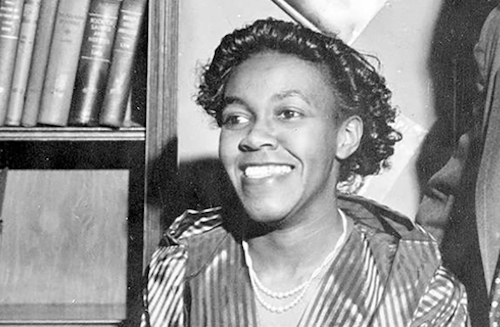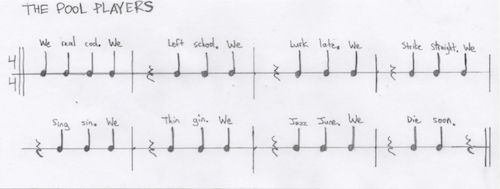'It's Got a Backbeat, You Can't Lose It': The Rhythm of 'We Real Cool'

Like you, I first met Ms. Brooks outside the famous Golden Shovel. In the spring of 2001, "The Pool Players" was lesson number one in Fran Quinn's undergraduate poetry workshop at Butler University. He passed out an oversized sheet of poems, a mimeographed poetry collage he'd literally cut and pasted of Yehuda Amichai, D.H. Lawrence, Denise Levertov, (Indy's own) Etheridge Knight, Brooks, David Ignatow, et al., all in different fonts and traveling different directions. In the slyly solicitous manner that a carnival barker invites a sucker to toss a beanbag into a barrelhead or pitch a ring into a table of bottles, Frannie invited us to read aloud "The Pool Players." It was the shortest piece on the sheet.
Did we sense some deception in the apparent simplicity? We did. Of the three of us who gave it a try, no one read the poem, to quote Yeats, "as if't 'twere prose." Each in his own way, we attempted to translate the visual data (line length, line break, stanza break, presence of rhyme) into aural effect. And each in his own way completely missed "The Pool Players." Contestant #1 stressed the rhymes, as one might the final syllable of a line of rhyming iambic verse. A good enough idea, but the poem clunked. Latching onto the rhetorical anaphoral. Contestant #2 barked out every instance of the word "We," ignoring the line breaks utterly. The rhythmic result was akin to an angry, militaristic waltz.
1 2 3 /1 2 3 /
We real cool. / We skip school.
I went third and instead of trying what neither had tried, my tack was to combine both efforts. I stressed everything I could stress, every "We" and every rhyme. "The Pool Players" staggered like a peacock, shot while strutting. My pauses were abrupt, dramatic, and long at every period, every line break. It was fantastically bad.
As for Fran, he was pleased like a pitcher who's just struck out the side. To teach us to read a poem, he first needed to teach us that we needed teaching, and we'd just shown that to ourselves. By way of an object lesson, in a wry observant tone, he proceeded to say "The Pool Players" in the rhythm that Ms. Brooks herself delivered it. It was a poem unlike any I'd heard. The jazz came out. The cool came out. The tonal complexity, subtlety, and insouciance came out. The poem's fundamental attitude toward reality filled our room.
So what was so different about the way Fran read it? Essentially, the difference was the "backbeat," the rhythm on which "The Pool Players" depends. Fran honored the presence of the backbeat, and the stresses landed in the right places; we didn't know there even was a backbeat, and we made rhythmic Swiss cheese.
The backbeat, which began cropping up in American music in the late 1930s, places emphases on the second and fourth beats in a bar of 4/4. We associate this pattern of stresses, this way of marking and sculpting time, with blues, jazz, rock and roll, funk, hip-hop. These styles of music don't exist without it.
1 2 3 4
Taking a cue from our most insightful recent commentator on poetic rhythm, the fictional anthologist Paul Chowder, I've written out the eight lines of "The Pool Players" as eight bars of 4/4. The goal is to show how this poem summons the backbeat and interacts with it, incorporating silence into the rhythm as a necessary feature. Now, in recordings of this poem, you hear that Brooks herself played with "The Pool Players"; she stretched it and snapped it, grew and shrunk its syllables, let her voice out. But beneath her play is the foundational backbeat rhythm, with stresses on two and four:

What you hopefully see, even if you're not a music person, is a correspondence between the bar of music and the line of poetry. As I rattle my brain, I realize it's actually an unusual piece of mimesis for a poetic line. Brooks conjures a bar of four quarter notes by using four monosyllabic words. By mirroring the pattern of the final three words and employing the line break, she's able to create temporal space at the beginning of every line that follows. It's genius.
To get a sense for how this rhythm feels and sounds, try tapping it out. If you're not musical, it's probably easiest to let the four fingers of your right hand correspond to the four beats of the bar. Tap the second and fourth a little harder, pairing the words with the beats:
1 2 3 4
We real cool we
From there, stop tapping your first finger on the downbeat (i.e. the first beat of the measure). Keep time, and tap only beats 2-3-4:
rest 2 3 4
left school we
rest 2 3 4
lurk late we
rest 2 3 4
strike straight we
Do you feel it? It's okay if it takes you a few times. Once you get it, it ought to feel familiar. Another term for the rhythm is "One-Drop"; it's the rhythm that defines reggae to the ear. The drummer leaves out the downbeat ("drops the one"), treating the first beat of the measure as a rest. An added stress on the two is unavoidable. The two becomes the highest hill in every bar, which is very much the case in "The Pool Players." The loudest words in the poem are "real," "left," "lurk," "strike," "sing," "thin," "jazz," and "die." These words are empowered by their metrical position; meanwhile, the other words in the poem are strengthened either by anaphoric repetition ("We") or full rhyme. Basically, you will, nowhere, find a poem with so much ooomph in every word. The horse of every syllable is harnessed. Again, genius.
Fran took us to Brooks to show us how silence could be built into a poem, how it can be essential to a poem, and he asked us another trick question that day. Where does the poem end? Of course you already know. "The Pool Players" ends not on the word "soon," but with the silence that follows. And that beat of silence, that lack of a "We," takes a stress. The reader spends a moment more of real time with these young men and their fates. In that beat, which approximates a moment of regard, one finds (I think) a glint of the spiritual genius of Ms. Brooks.
My hope in this blog post (until several hours ago, in fact) was to try to thumb the pulse of the one feature of Brooks's poetic personality that travels through the entirety of her six-decade body of work. That feature of her personality might be characterized in a number of ways—as unselfcenteredness, as radical empathy, as the I-thou relationship, as the Christian ideal, or simply as love. Love, you might say, is the tic of Brooks's poetic personality. She wrote with an activated awareness that other people were as fully human, as fully conscious, as she was. In this, she's unique among the major American poets. No poet with such chops (see, "The Anniad") has been less self-obsessed, and that's been my observation after spending some of every day of the last five months with her work. But if love (which is impossible without this activated awareness) is a resolution in many of her poems (see "the mother"), it is also a trigger. It begins her poems. What's outside the proverbial window is the poet's own interior, if what's out the window is let in. And the awareness of others as fully human and fully conscious, enters swiftly when we let it in. In Brooks, that awareness begets poetry.
Before a reading of "The Pool Players," she recounted passing by the pool hall that so famously set the poem going. Like O'Hara on his ferry ride, or Bishop with her moose, it's a scene worth imagining. Because the poem is swift and small, we tend to forget that pool halls aren't. A street level pool hall must have taken her a minute to walk past. Chicago in June; the weather might have been hot; she might have been thirsty, or with an ache in her foot, or a pimple on her nose, or have had any of hundreds of other reasons for being focused entirely on herself. There must have been music, and if it was the late 1950s in the South side of Chicago, that music must have had a backbeat. Lifting her eyes, judgment being an instantaneous phenomenon, she might have dismissed the pleasurably idling youths, the way we dismiss the kids playing video games on their smart phones. "But instead of asking myself, 'Why aren't they in school?' I asked myself, "I wonder how they feel about themselves...."
Poet Matthew Yeager was born in Cincinnati, Ohio. He is the author of the poetry collection Like That...
Read Full Biography

